Introduction
Navigating the intricate world of commercial property transactions requires a comprehensive understanding of title searches, a crucial process that safeguards investments and ensures smooth dealings. A title search involves a meticulous examination of public records to verify ownership and identify any liens or encumbrances that could impact a property's value. As the stakes in real estate continue to rise, the importance of conducting thorough title searches cannot be overstated; they not only protect buyers from potential legal disputes but also foster trust and reliability in the market.
This article delves into the step-by-step process of conducting a title search, the significance of identifying common title issues, and the advanced tools available today that enhance efficiency and accuracy in title research, ultimately equipping real estate professionals with the knowledge necessary to secure successful transactions.
Understanding Commercial Property Title Searches
Performing a commercial real estate title review is an essential step in transactions, involving a comprehensive analysis of public records to verify ownership and reveal any liens or encumbrances. This meticulous process is vital for ensuring that the asset is free from legal issues that could hinder the transaction. Title investigations typically involve scrutinizing various documents, including deeds, mortgages, and tax records, to construct a comprehensive history of the property.
Grasping the intricacies of document investigations is crucial for property experts, as it aids in protecting their clients' investments and avoiding potential legal conflicts. The high highlights the significance of reducing risks through thorough research and preparation, a principle that applies equally to property transactions. Just as startup founders must understand pitfalls that lead to failure, property professionals must prioritize comprehensive examinations to mitigate risks and foster successful outcomes.
In real estate, carrying out an ownership investigation usually includes actions like:
- Confirming possession through public records
- Reviewing for outstanding mortgages
- Recognizing any liens that might influence the asset's value
For example, a property examination may uncover a prior owner’s unpaid taxes that could lead to a lien on the asset, which must be addressed before the sale can move forward.
Leveraging advanced machine learning tools, such as those offered by Parse AI, can significantly enhance the efficiency of document processing within this context. Parse AI offers automation for research on property documents, enabling quicker extraction of essential information from these documents, thus allowing researchers to finalize abstracts and reports with enhanced speed and precision. Additionally, the interactive labeling feature allows users to customize data extraction, tailoring the process to specific needs and ensuring precise results. Enhanced courthouse document processing capabilities, including full-text search and machine learning extraction, empower professionals to access comprehensive data swiftly, streamlining runsheet creation and improving overall workflow.
Furthermore, Harbinger Land's dedication to thorough and precise research guarantees that clients can confidently obtain land rights and assets in their areas of interest. Their curative services aid in examining ownership opinions and resolving any identified issues, ensuring a clear chain of ownership and precise leasing for property and mineral owners. Expert insights from experienced property professionals underscore the importance of thorough ownership investigations, highlighting that a well-conducted examination not only safeguards clients' interests but also promotes trust and dependability in property transactions. By staying informed about recent updates on legal matters and employing best practices in property examination processes, real estate professionals can enhance their expertise and deliver superior service to their clients.
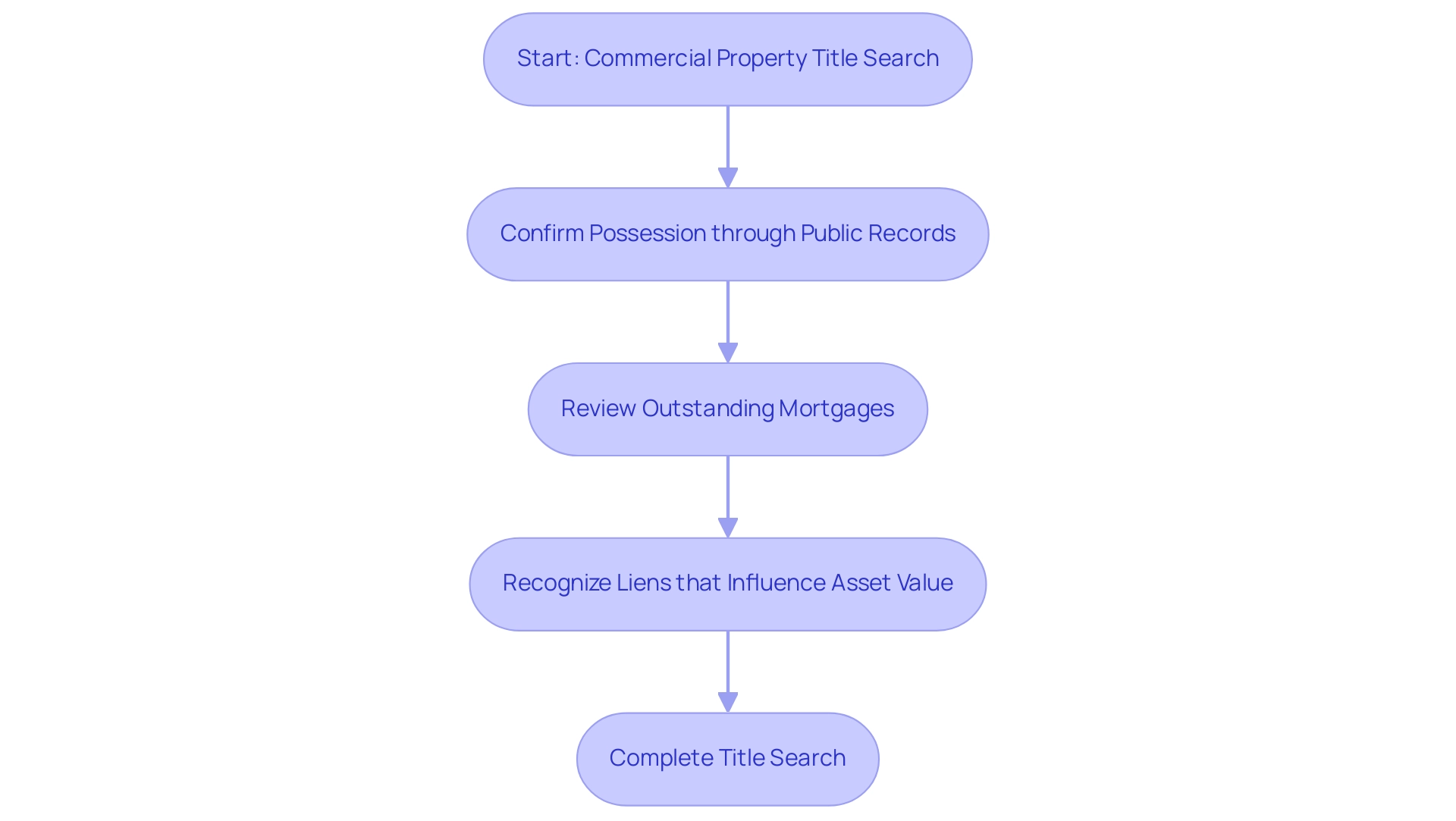
Step-by-Step Process for Conducting a Title Search
To commence a comprehensive examination, the initial step is to collect all necessary information regarding the asset. Start with the legal description, address, and parcel number. These pieces of information are foundational and ensure that you are targeting the correct records. Inaccuracies in this stage can lead to significant issues later on, such as overlooking critical documents or misidentifying property ownership.
Based on , the average duration needed to perform a property examination is roughly 30 days, while about 25% of such examinations uncover liens or encumbrances.
As Jeffrey Hall, an Associate Professor of Communication Studies, points out, 'Make it a priority to spend time with potential friends,' indicating a proactive method to foster connections—similar to the effort needed in comprehensive inquiries.
Furthermore, maintaining accurate and detailed records is crucial for compliance with judiciary policies that encompass ethics, workplace conduct, and privacy regulations.
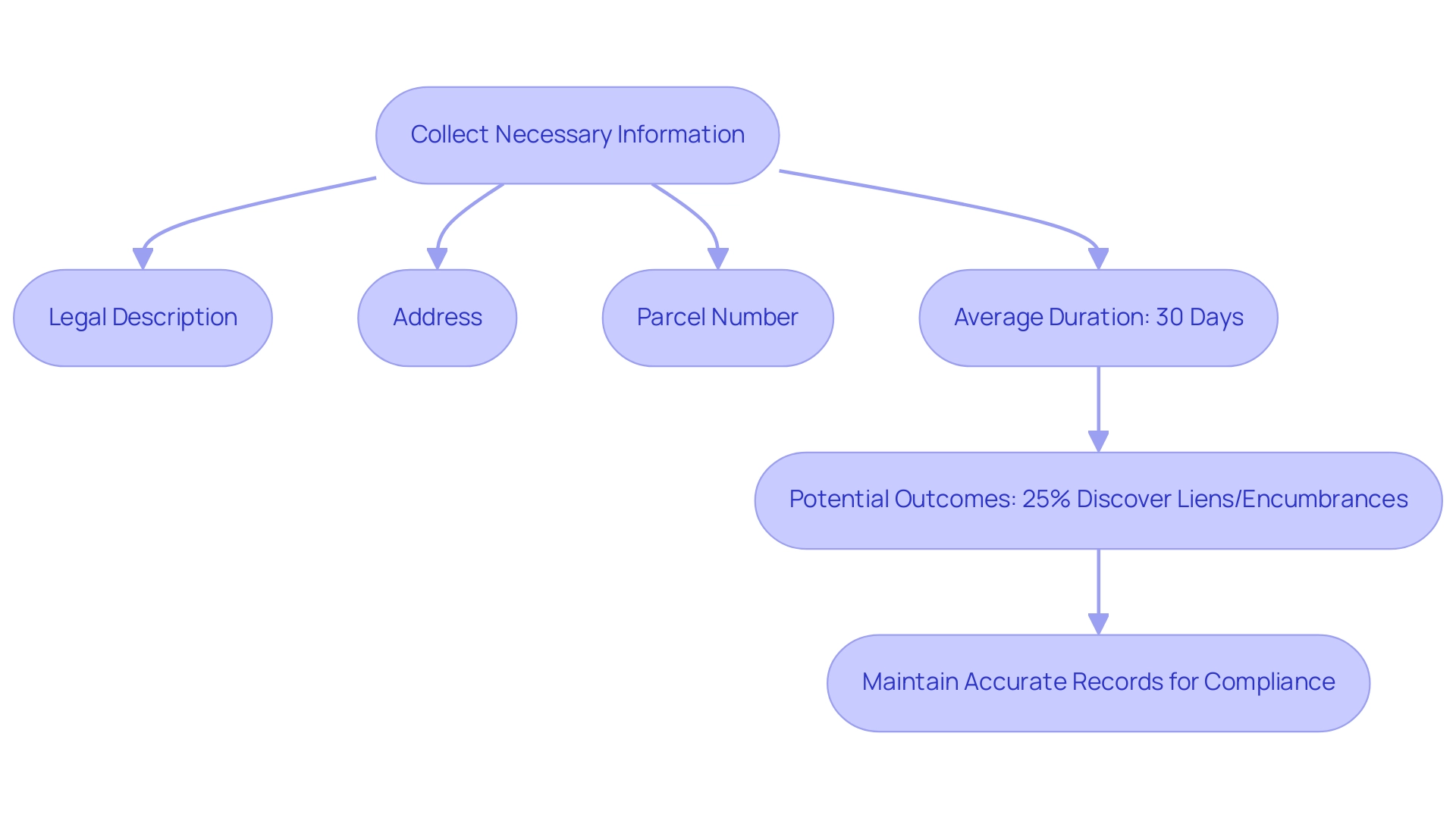
The Importance of Title Searches in Safeguarding Investments
Title investigations are a vital component in protecting property investments. By identifying potential issues such as outstanding liens, boundary disputes, or ownership claims, they enable buyers to avoid costly legal disputes and ensure smooth transactions. Recent data shows that incidents of theft/loss and improper disposal have decreased significantly, with only 23.86% of theft/loss incidents and 37.77% of improper disposal cases reported in the last four years. This trend highlights the significance of due diligence in property transactions; performing comprehensive examinations can reduce the risks linked to these incidents.
According to Raees Ahmad Khan from the Department of Information Technology at Babasaheb Bhimrao Ambedkar University, 'Data breaches are usually classified into two major categories: internal and external,' highlighting the necessity for comprehensive checks in property as well.
Neglecting to conduct comprehensive examinations of ownership can result in unexpected issues and significant monetary losses. For instance, the persistence of improper disposal cases, which represent a significant portion of incidents, poses ongoing risks that must be addressed. The research conducted by Ostertagova and Ostertag on forecasting using simple exponential smoothing, published in Acta Electrotech Inform, further emphasizes the importance of precise data analysis in predicting and mitigating risks in various sectors.
In property transactions, document reviews not only offer reassurance but also safeguard assets from unexpected dangers. The methodologies utilized in predicting healthcare data breaches, such as Simple Moving Average (SMA) and Simple Exponential Smoothing (SES), can likewise be applied to estate transactions to proactively manage risks. These case studies demonstrate the significance of comprehensive examination and diligence, emphasizing that document reviews are essential for safeguarding real estate investments and providing long-term protection for purchasers.
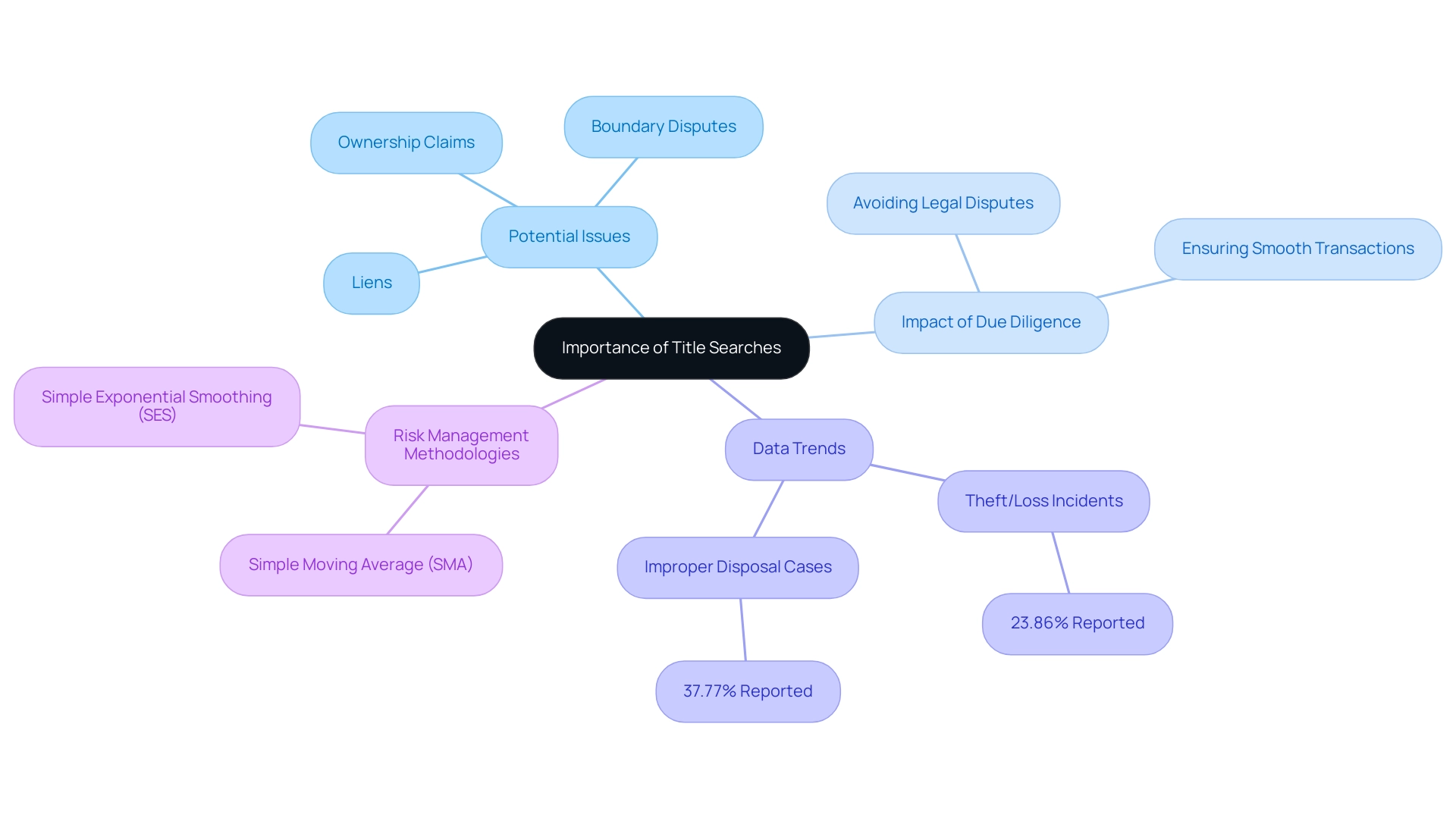
Interpreting Title Search Results: What You Need to Know
After finishing a real estate ownership search, it is crucial to carefully examine the results for a comprehensive understanding of the asset's status. Key findings typically include:
- Clear Title: A clear title signifies the absence of any outstanding liens or claims against the property, facilitating a smooth transaction process. According to recent data, approximately 70% of searched assets have clear titles, making this status crucial for ensuring the asset's marketability and transferability without legal complications.
- Liens or Encumbrances: The presence of liens or encumbrances requires careful consideration. Comprehending the nature and implications of these claims is essential, as some may require resolution before moving forward with the sale. Common issues include tax liens, mortgage liens, and mechanic's liens, each carrying specific legal and financial ramifications. For instance, assets with tax liens may necessitate payment of outstanding taxes before a sale can take place, affecting both the sale timeline and the financial aspects for potential buyers.
- Sequence of Ownership: Analyzing the sequence of ownership entails examining the historical documentation of asset possession to pinpoint any gaps or inconsistencies. Maintaining a consistent and transparent chain of ownership is essential to protect against possible conflicts and confirm the legal history of the asset. A fractured chain of ownership can result in claims against the asset, which may complicate or even invalidate a sale.
Should any discrepancies or uncertainties arise during this analysis, it is advisable to seek clarification from legal professionals. Their expertise ensures compliance with relevant regulations and provides protection against future legal disputes, thereby securing a reliable and transparent property transaction.
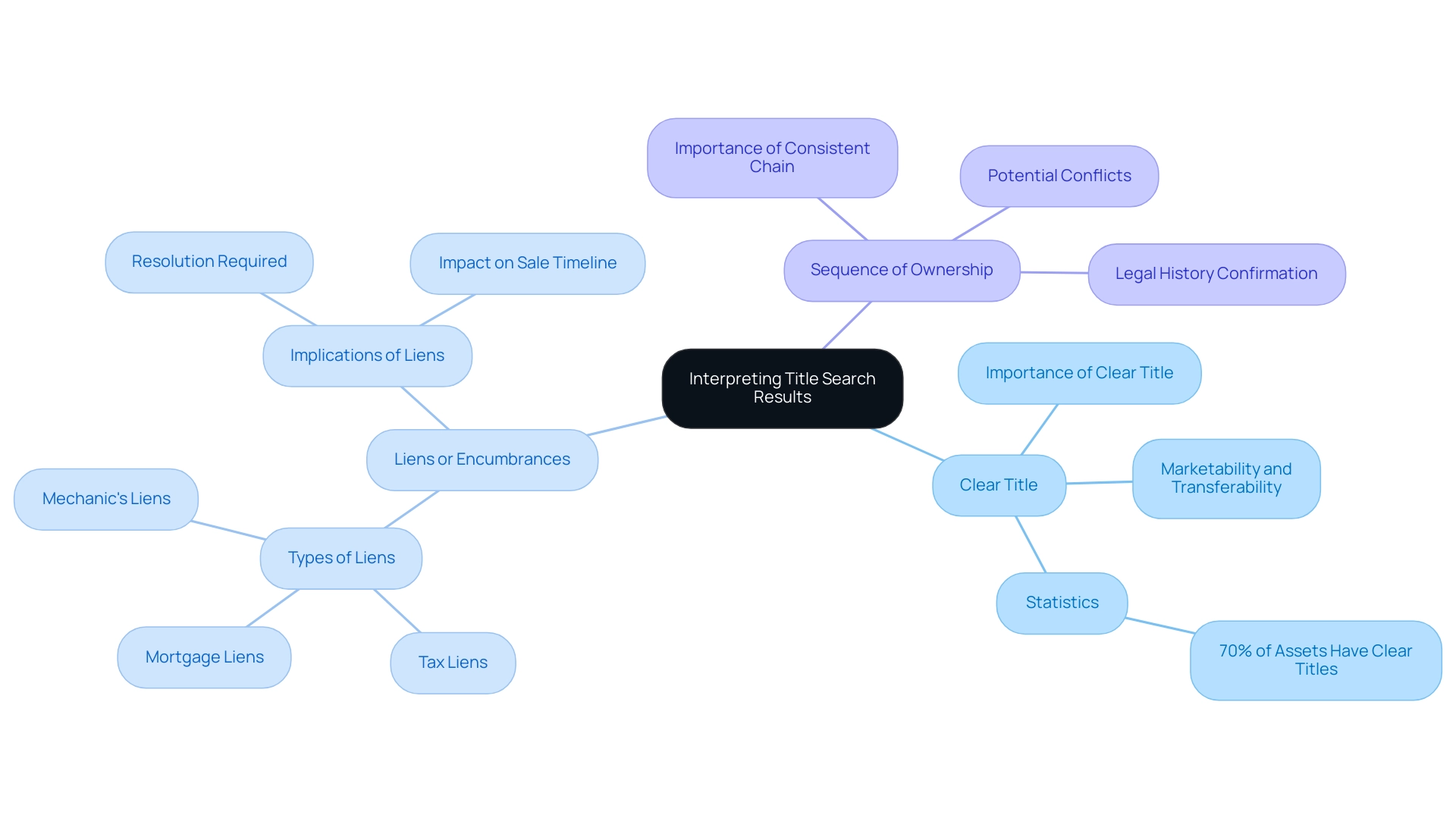
Common Title Issues and How to Resolve Them
Common ownership problems in real estate transactions can significantly affect possession and the overall transaction process. One prevalent issue is . If such a lien is discovered after the purchase, it can complicate ownership and financial responsibilities. As noted by the HOA Center, amending an approved budget often requires a special meeting where the membership can veto the changes—highlighting the importance of due diligence in identifying any outstanding liens before finalizing the sale. Statistics indicate that unless a majority of owners veto the proposed budget, it becomes the approved budget of the association, further emphasizing the necessity of thorough title research.
Boundary disputes are another common issue, often arising from discrepancies in land lines. These disputes can lead to legal complications and delays. To mitigate this, hiring a professional land surveyor is advisable. They can provide precise boundary documentation, helping to clarify property lines and avoid conflicts.
Claims of ownership present yet another challenge, particularly when multiple parties assert ownership rights. In such cases, consulting with a real estate attorney is crucial. They can help navigate these claims and establish rightful ownership, ensuring that all legal avenues are properly addressed.
Proactively addressing these common issues can ensure a smoother transaction process and safeguard investments. For instance, meeting minutes must be kept as permanent records, detailing discussions, motions, and actions taken during meetings, as specified in the Colorado Common Interest Ownership Act. This practice provides a historical record of the association's decisions and promotes accountability. By being vigilant and thorough, professionals can mitigate risks associated with common title issues.
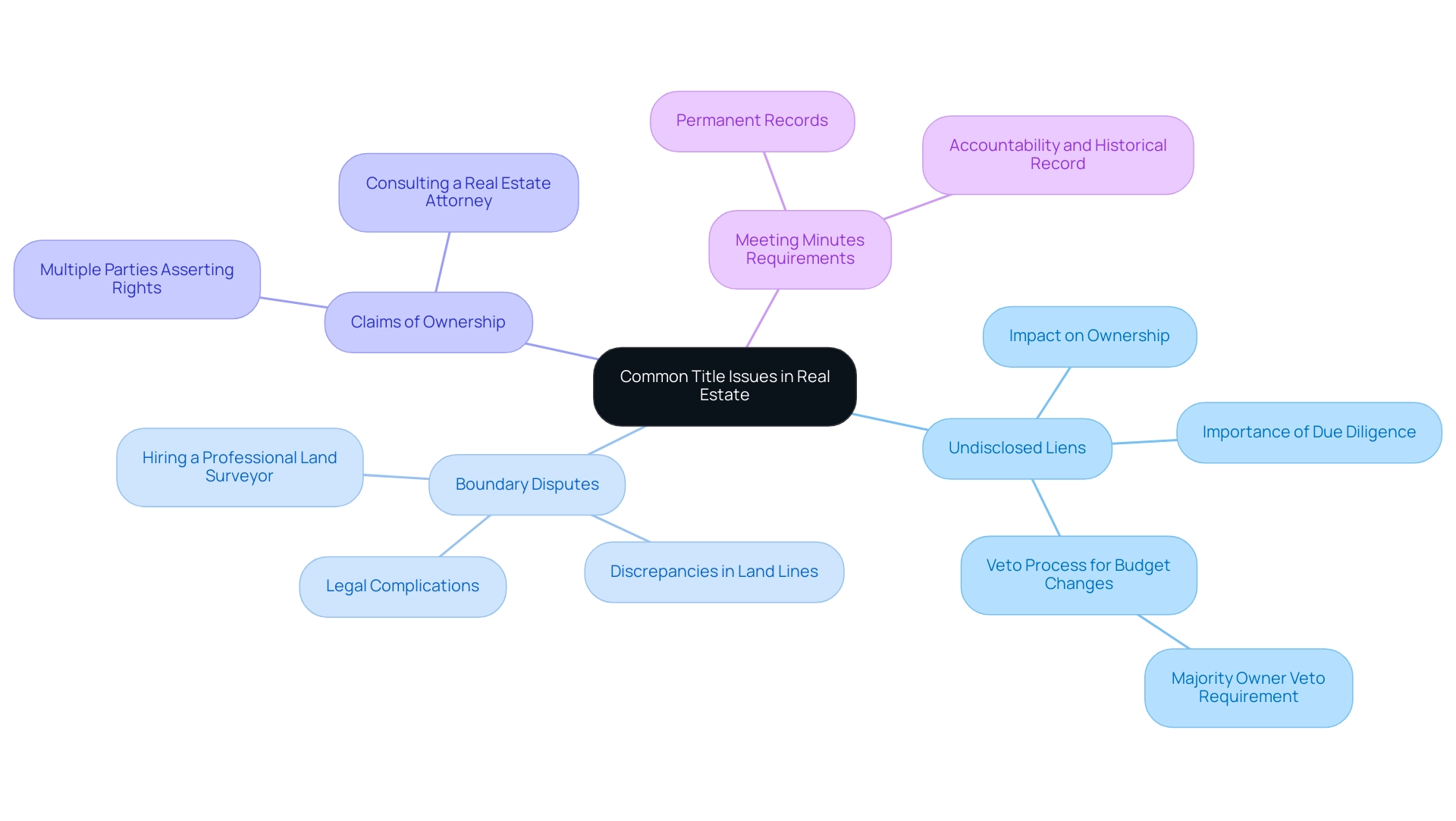
Conclusion
Conducting a comprehensive title search is an indispensable practice in the realm of commercial property transactions. It serves not only to confirm ownership but also to uncover any potential liens or encumbrances that could hinder a sale. The meticulous nature of title searches ensures that buyers can navigate the complex landscape of real estate with confidence, safeguarding their investments against unforeseen legal disputes.
The step-by-step process outlined emphasizes the importance of accurate information gathering, as even minor inaccuracies can lead to significant complications down the road. The integration of advanced tools, such as those provided by Parse AI, enhances the efficiency and accuracy of title research, allowing real estate professionals to expedite their processes while maintaining high standards of diligence.
Moreover, understanding the various potential title issues—ranging from undisclosed liens to boundary disputes—underscores the necessity of thorough due diligence. By proactively identifying and addressing these challenges, real estate professionals can not only protect their clients' interests but also foster a sense of trust and reliability in the market.
In conclusion, the significance of conducting thorough title searches cannot be overstated. As the stakes in real estate transactions continue to rise, equipping oneself with the knowledge and tools to navigate these complexities will prove essential in securing successful outcomes and ensuring the long-term protection of investments.
Frequently Asked Questions
What is the purpose of a commercial real estate title review?
A commercial real estate title review involves a comprehensive analysis of public records to verify ownership and identify any liens or encumbrances on the property. This process is essential to ensure that the asset is free from legal issues that could impede the transaction.
What documents are typically scrutinized during a title investigation?
Title investigations typically involve reviewing various documents, including deeds, mortgages, and tax records, to construct a complete history of the property.
Why is it important for property experts to understand document investigations?
Understanding document investigations is crucial for property experts as it helps protect their clients' investments and avoid potential legal conflicts, thereby ensuring successful transactions.
What steps are involved in conducting an ownership investigation?
An ownership investigation generally includes confirming possession through public records, reviewing outstanding mortgages, and identifying any liens that may affect the asset's value.
How long does it usually take to perform a property examination?
The average duration needed to perform a property examination is roughly 30 days, with about 25% of examinations uncovering liens or encumbrances.
What are the key findings from a real estate ownership search?
Key findings typically include: Clear Title (indicates no outstanding liens or claims against the property), Liens or Encumbrances (presence of claims that may need resolution before the sale), and Sequence of Ownership (analyzing the historical documentation to ensure a consistent and transparent chain of ownership).
What are common ownership problems in real estate transactions?
Common problems include undisclosed liens, boundary disputes, and claims of ownership by multiple parties. These issues can complicate ownership and financial responsibilities and may require professional assistance to resolve.
How can advanced tools enhance the title review process?
Advanced machine learning tools, such as those offered by Parse AI, can improve the efficiency of document processing by automating research on property documents, enabling quicker extraction of essential information, and customizing data extraction to specific needs.
What should be done if discrepancies arise during the ownership analysis?
If discrepancies or uncertainties arise, it is advisable to seek clarification from legal professionals to ensure compliance with regulations and protect against future legal disputes.
How do comprehensive examinations mitigate risks in property transactions?
Comprehensive examinations help identify potential issues such as outstanding liens, boundary disputes, or ownership claims, allowing buyers to avoid costly legal disputes and ensure smooth transactions.




